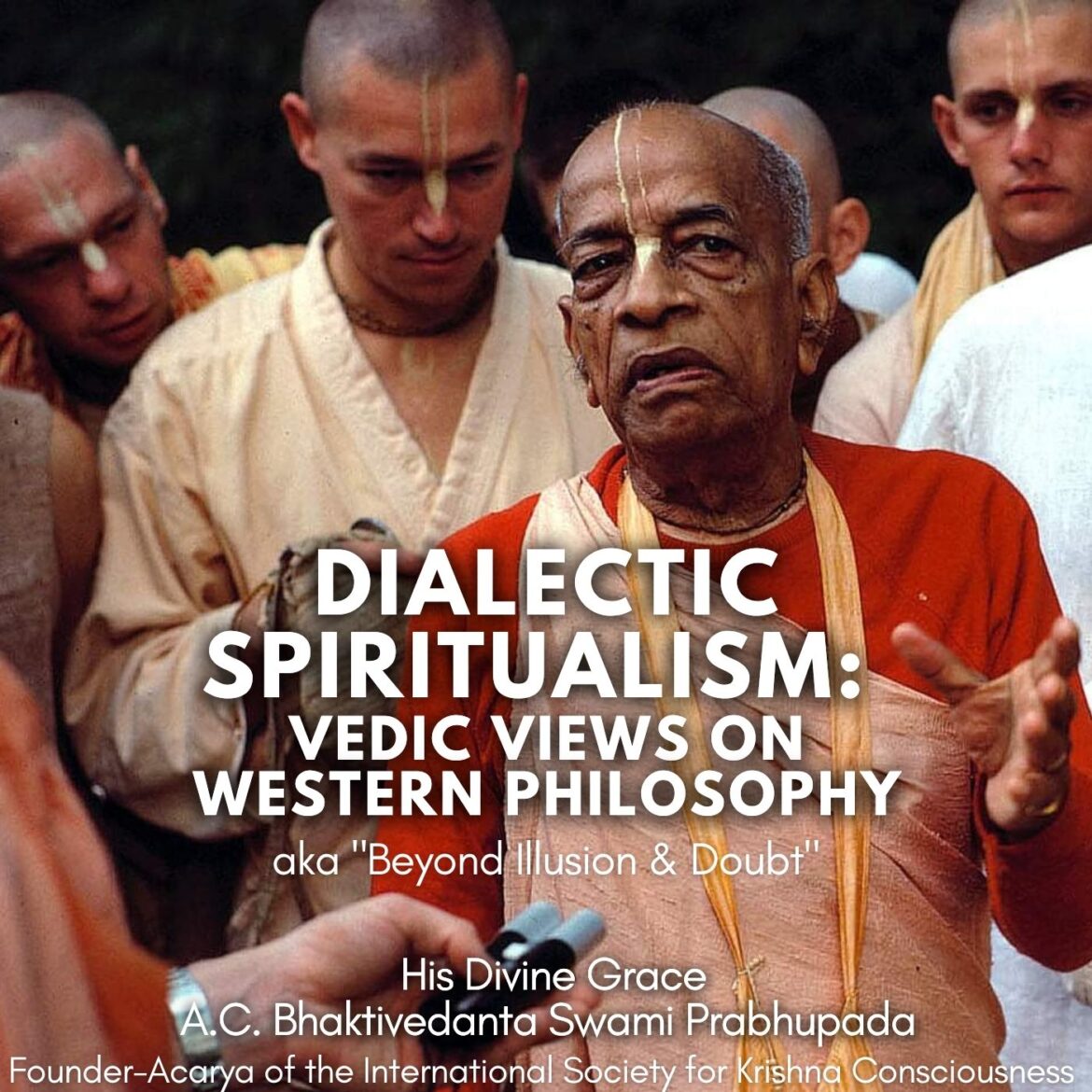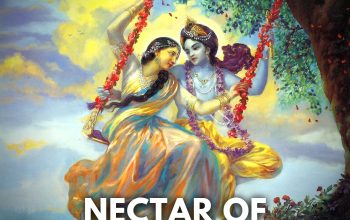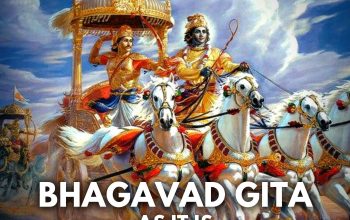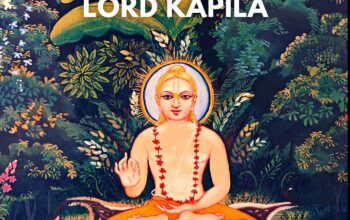In Srila Prabhupada’s own words “We are discussing Socratic philosophy in order to strengthen our Kṛṣṇa consciousness. Therefore the ultimate goal is Kṛṣṇa; otherwise we are not interested in criticizing or accepting anyone’s philosophy. We are neutral.” In this way he discussed:
1. Socrates
2. Plato
3. Aristotle
4. Origen
5. Augustine
6. Thomas Aquinas
7. Kierkegaard
8. Schopenhauer
9. Darwin
10. John Stuart Mill
11. Marx
12. Nietzsche
13. Freud
14. Sartre
15. Carl Jung
Srila Prabhupada would always give credit where credit is due, so if some point of their philosophy would reflect the Absolute Truth, He would agree with it & quote scriptures in support of the statement. But if it would not – He would shred it to pieces with logic, common sense, best & choice arguments. It’s a pleasure to read. And I love the original title of the book, which was given by Srila Prabhupada himself, “Dialectic Spiritualism: Vedic Views On Western Philosophy“, even though it is presently published under the name “Beyond Illusion and Doubt”.
Episodes playlist 311-361

Reading books by Srila A.C. Bhaktivedanta Swami Prabhupada daily. Each of these books is a literary masterpiece, they have all the answers to any questions of life and everything necessary to uplift and nourish our soul, develop our loving relationship with God, Krishna, and help us relish our adventurous spiritual journey. Such a deep, bonafide, theological science based on Vedic scriptures has never been presented like this before. Chant Hare Krishna, dive into these books, be happy and make others happy! From Mayapur with love, Your humble servant, Sulalita devi dasi
Concerning the social situation, Jung wrote, “It is unfortunately only too clear that if the individual is not truly regenerated in spirit, society cannot be either, for society is the sum total of individuals in need of redemption.”
Śrīla Prabhupāda: The basis of change is the individual. Now there are a few individuals initiated into Kṛṣṇa consciousness, and if a large percentage can thus become invigorated, the face of the world will change. There is no doubt of this. ••• “Dialectic Spiritualism: Vedic Views on Western Philosophy”, now published as “Beyond Illusion & Doubt”, is a compilation of conversations with Srila Prabhupada comparing the conclusions of Vedic wisdom with those of Western philosophers, such as Aristotle, Socrates, Plato, and many others. Srila Prabhupada gives each credit for their sincerity, but after all, to err is human, human life is short, and there’s only so much that even the greatest philosopher can know. It’s possible to know something about Ultimate Reality by intellectual endeavor, but for perfect and complete knowledge, one must approach the source ••• find the book links here: sravanamdiaries.com/dialectic-spiritualism/

One of my Favorite Quotes
Disciple: It is interesting that nowadays we find the kind of relativism taught by the Sophists to be again very widespread: “If you believe it, then it’s true for you.” Socrates took up the task of vigorously combating this position, trying to demonstrate by strong arguments that there must be an absolute truth that is distinguishable from the relative and that must be categorically acknowledged by everyone.
Śrīla Prabhupāda: That is what we are also doing. The Absolute Truth is true for everyone, and the relative truth is relative to a particular position. The relative truth depends on the Absolute Truth, which is the summum bonum. God is the Absolute Truth, and the material world is relative truth. Because the material world is God’s energy, it appears to be real or true, just as the reflection of the sun in water emits some light. But that reflection is not independent of the sun, and as soon as the sun sets, that light will disappear. The Absolute Truth is Kṛṣṇa, and this cosmos is relative truth, a manifestation of Kṛṣṇa’s external energy. If Kṛṣṇa withdrew His energy, the cosmos would not exist.
In another sense, Kṛṣṇa and Kṛṣṇa’s energy are not different. We cannot separate heat from fire; heat is also fire, yet heat is not fire. This is the position of relative truth. As soon as we experience heat, we understand that there is fire. Yet we cannot say that heat is fire. Relative truth is like heat because it stands on the strength of the Absolute Truth, just as heat stands on the strength of fire. Because the Absolute is true, relative truth also appears to be true, although it has no independent existence. A mirage appears to be water because in actuality there is such a thing as water. Similarly, this material world appears attractive because there is actually an all-attractive spiritual world.
Disciple: Socrates held that the highest duty of man was to “care for his soul,” that is, to cultivate that healthy state of soul which is true knowledge, the attainment of the good. When a man becomes fixed in such knowledge he will as a matter of course act correctly in all affairs, he will be beyond the dictates of the passions, and he will remain peaceful and undisturbed in every circumstance. Socrates himself seems to have attained such a state, as his own behavior at the time of his death illustrates: he calmly drank the poison hemlock rather than give up his principles. He seems to have realized knowledge of at least some aspect of the Absolute Truth, although we must add that he never spoke of it as a person or gave it a personal name.
Śrīla Prabhupāda: That is the preliminary stage of understanding the Absolute, known as Brahman realization, realization of the impersonal feature. One who advances further attains Paramātmā realization, realization of the localized feature, whereby one realizes that God is everywhere. It is a fact that God is everywhere, but at the same time God has His own abode (goloka eva nivasaty akhilātma-bhūtaḥ). God is a person, and He has His own abode and associates. Although He is in His abode, He is present everywhere, within every atom (andāntara-stha-paramāṇu-cayāntara-stham). Like other impersonalists, Socrates cannot understand how God, through His potency, can remain in His own abode and simultaneously be present in every atom. The material world is His expansion, His energy (bhūmir āpo ’nalo vāyuḥ khaṁ mano buddhir eva ca). Because His energy is expanded everywhere, He can be present everywhere. Although the energy and the energetic are nondifferent, we cannot say that they are not distinct. They are simultaneously one and different. This is the perfect philosophy of acintya-bhedābheda-tattva, inconceivable simultaneous oneness and difference.
Chapter 1



